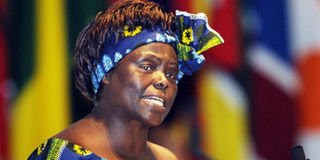Slow climb for women in the private sector

The late Nobel Peace laureate Prof Wangari Maathai. PHOTO | FILE
What you need to know:
- A recent study by Chartered Institute of Marketing shows that state-owned firms have outperformed private companies on gender balance in the boardroom.
- The Female Future Programme covers three modules — leadership, board competency and rhetoric. An agreement has been established with Oslo and Akershus University (HiOA) for quality assurance. The university will grant 10 Credit Masters points for the Board Competence Module.
It is 10am in a company boardroom somewhere in the city.
The meeting has just been adjourned and the board members file out, talking loudly amongst themselves.
Back thumps and hearty laughs reveal friendships borne of an intricate old boys’ network. Indeed, the jokes might as well be crass and bawdy, because no women are present. Such is the reality across boardrooms in Kenya.
When it comes to empowering women, experts advise that instead of clamouring for more positions to be ‘given’ to women, a much better option would be equipping them with the viable leadership skills that would get them more competitively placed in the job market.
To put it in the words of the late Nobel Laureate Prof Wangari Maathai, the higher you go, the less women you see. Currently, only three women are chief executive officers in publicly listed companies — Ada Eze of Total Kenya, Maria Msiska of BOC Kenya Limited and Nasim Devji of Diamond Trust Bank.
A recent study by Chartered Institute of Marketing shows that state-owned firms have outperformed private companies on gender balance in the boardroom. And research by the Kenya Institute of Management shows that women occupy about 12 per cent of board seats in Nairobi’s listed companies, compared to 20 per cent among State-owned firms. Evidently, the private sector has failed to fulfill the constitutional requirement of 30 per cent gender equity in every way.
And that is precisely the problem the Federation of Kenyan Employers is trying to solve by launching a Female Future Programme. They graduated their first class of 15 women in February this year.
The initiative is a flagship leadership development programme of the FKE, which aims to strengthen gender equality in the workplace as well as draw more women to the top echelons of the private and public sectors.
It is a programme that the FKE Executive Director, Mrs Jackline Mugo, hopes will expose corporate boards to the women’s talent pool.
The Female Future Programme covers three modules — leadership, board competency and rhetoric. An agreement has been established with Oslo and Akershus University (HiOA) for quality assurance. The university will grant 10 Credit Masters points for the Board Competence Module.
So far, it has trained 20 trainers and targetd to have at least 500 graduates by the end of 2017. The second class, Mrs Mugo says, is almost full. FKE has also enlisted the support of existing corporate and public sector chief executives and board chairmen to champion the nomination of more women to the programme.
“This is all part of our national campaign to increase the gender representation in decision making roles as we strive to meet the constitutional one-third threshold,” she said.
Mrs Mugo envisages that 65 per cent of women trained will be promoted to senior positions in the board within 18 months. In five years, she projects that another 60 per cent will take senior management positions in companies listed in the Nairobi Securities Exchange. In the long run, she hopes that 90 per cent of companies listed on the bourse will have at least one woman on their board.
A study by global consultancy firm McKinsey in 2007 found that companies with significant numbers of women in senior management did better in leadership, accountability and innovation. These attributes were associated with higher operating margins and market capitalisation.
“Women are by nature nurturers and can detect risks from a distance, therefore we see organisations that have more women having a higher return on capital,” said Bonface Ngahu, marketing director of Market Research and Consumer Trends, during a recent launch of a survey of women in boardrooms.
Speaking during the inauguration of the research organised by the Chartered Institute of Management in collaboration with Market Research and Consumer Trends company, James Ngomeli, chairperson of the Chartered Institute of Marketing, stated that out of the 75 per cent who are in the marketing community, only seven in a 100 make it to the board level.
“While women make up to 52 per cent of the economy, they are less that 15 per cent in the board level,” he said.
In the research, CIM aims to compare the performance of companies whose boards had more than 30 per cent women with those whose boards were male dominated. One of the preliminary key findings was that organisations that had more women than men had longer business expectancy.
He added: “We are not talking of excluding men, we are talking of including women in our boardrooms and seeing the magic that it brings.”
Change has been slow but there are now more women chairing boardrooms. Eveready East Africa has Lucy Waithaka chairing the board. Others are Susan Mboya-Kidero of Liberty Insurance, Khadija Mire of Uchumi Supermarkets, Anne Mutahi of Standard Chartered and Unga Limited’s Isabella Ochola-Wilson.
But until May 2012, Nelius Kariuki, the current board chairperson Kenya-Re, was the only woman chair among the 60 companies listed at the NSE.
Ms Mugo explains that the idea of having more women in the top management is not aimed at having them dominating the boardrooms, but discovering the opportunities available when a good number of women are included in board rooms.





